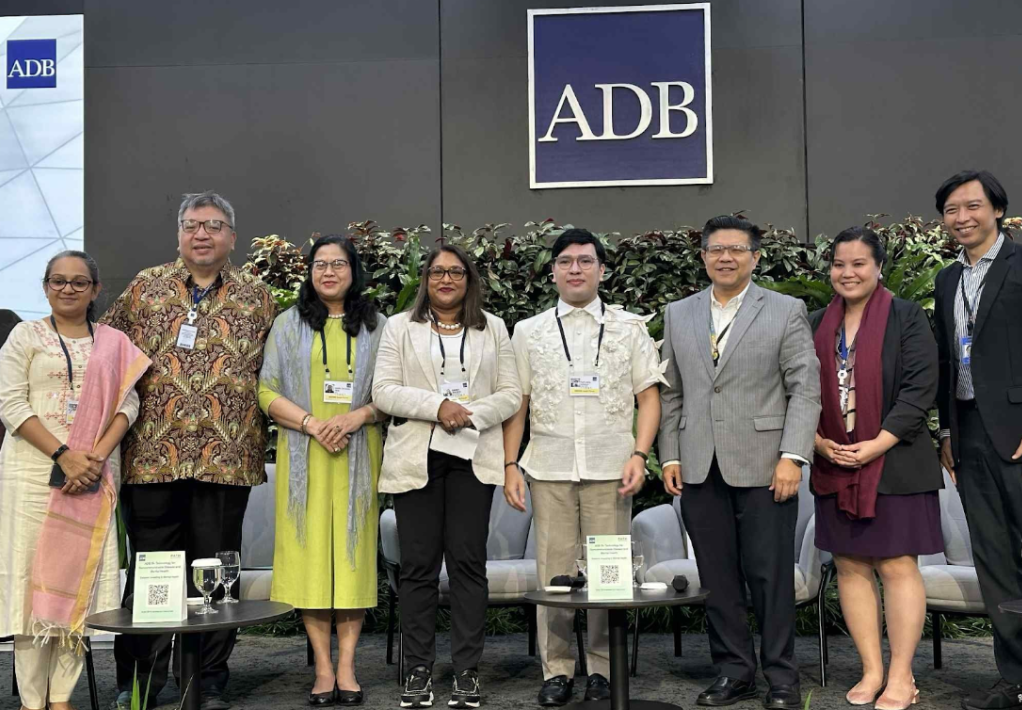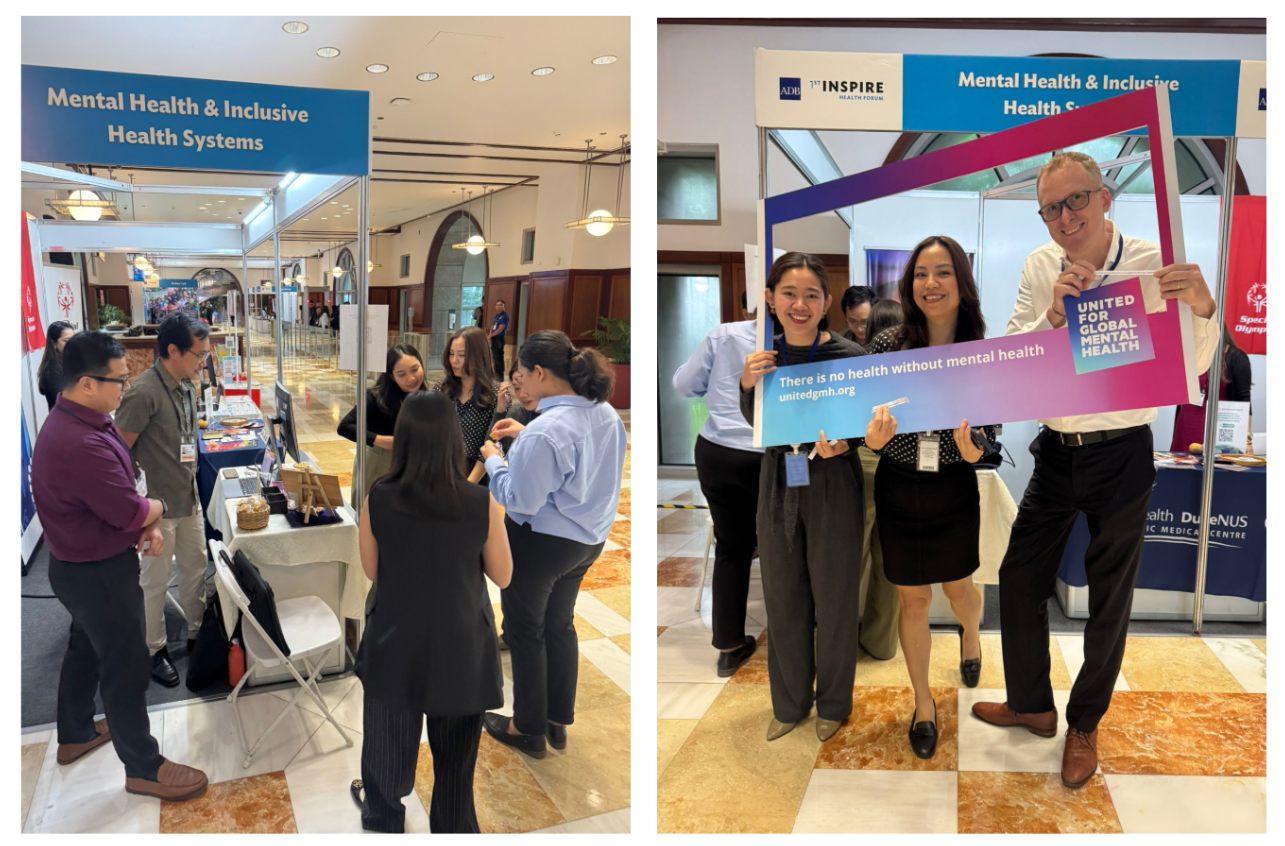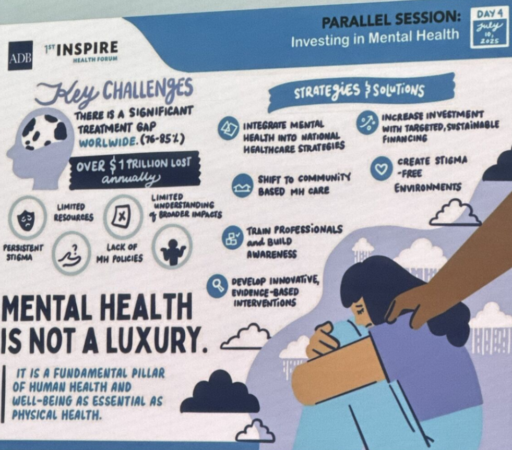It’s High Time Development Banks Prioritise Mental Health
Hear from Yves Miel Zuniga, who is our Policy and Advocacy Advisor.
Yves is the co-founder of MentalHealthPH and former senior program officer in the Department of Health, Philippines.
25th July 2025
At the inaugural INSPIRE Health Forum organised by the Asian Development Bank, one message rang loud and clear:
Mental health is not just a health issue — it’s a development issue.
We were honoured to bring this message to a powerful panel on investing in mental health, and even more thrilled to see mental health integrated across the event — thanks to the Asian Development Bank (ADB) and partners who are reshaping the global conversation.
 UnitedGMH with partners from ADB, WHO Western Pacific Region, WHO South-East Asia, and PATH
UnitedGMH with partners from ADB, WHO Western Pacific Region, WHO South-East Asia, and PATH
Representing United for Global Mental Health, I also had the opportunity to engage with over 100 visitors at the Innovations Marketplace, a dynamic space that showcased mental health innovations, cross-sector solutions, and big ideas. When ADB brought us into the room, they made space for mental health to take the stage.
 Visitors from ADB dropping by our Innovation Marketplace booth, with the support of partners from MentalHealthPH
Visitors from ADB dropping by our Innovation Marketplace booth, with the support of partners from MentalHealthPH
And that’s what it takes to shift the narrative.
Why mental health is everyone’s business
When people are mentally unwell, they’re less likely to go to school, stay in jobs, or access the health services they need. This means fewer productive workers, higher social protection costs, and fragile health systems that are unable to meet population needs. The ripple effects of poor mental health aren’t just personal but rather economic, social, and structural.
In short, no economy thrives on poor mental health. No health system is resilient without it. That’s why investing in mental health isn’t just a moral imperative; it is a smart policy.
What we know works
At UnitedGMH, we don’t work in silos. Mental health is a cross-cutting issue, and so is our approach. Through years of country-level work and global advocacy, we’ve found four things that consistently deliver impact:
- Evidence-backed advocacy: You can’t fund what you don’t understand. Data and lived experience must drive change and budgets.
- Strategic partnerships: Global health advances through coalitions and networks. Mental health needs to be a priority for institutions like the ADB, the Global Fund, WHO, and others.
- Locally led demand: We work with civil society organisations and national champions who are shaping policies from the ground up.
- Systems integration: Mental health can’t remain siloed in the path toward UHC. It needs to be integrated into HIV, TB, NCDs, and PHC—and yes, even climate and health programmes.
Integration isn’t just possible; it pays off.
Through our collaboration with The Global Fund, made possible by the Elton John AIDS Foundation, we’ve supported efforts to integrate mental health into HIV and TB services across countries such as Nigeria, Pakistan, the Philippines, and South Africa.
And the results?
- Integrating mental health into HIV programmes delivers a return of $1:6
- For TB services, the ROI jumps to $1:43.
This isn’t theoretical. It’s real, it’s measurable, and it’s happening now.
The window of opportunity is open, and best not to waste it
We’re at a pivotal moment. Health systems are rebuilding, countries are reassessing priorities post-COVID, and development banks are investing in resilience like never before.
This is the time to:
- Include mental health in national health, finance, and development plans
- Fund it through national budgets and loan portfolios
- Embed it across education, climate, employment, and social protection strategies
Mental health should no longer be an afterthought. It should be a pillar of national resilience and sustainable development.
 A creative way to capture ideas from the insightful parallel session on Investing in Mental Health
A creative way to capture ideas from the insightful parallel session on Investing in Mental Health
From conversation to action
We’re grateful to ADB, WHO Western Pacific, WHO South-East Asia, and PATH for making space for this urgent conversation, and for ensuring it doesn’t end here.
To ministers of health, finance, and planning, to donors, funders, and development institutions:
Mental health is an opportunity to make it part of your legacy.
The path forward is clear. The evidence is there. The demand is growing.
Let’s fund it. Let’s integrate it. Let’s start leading with it in our ambitions.
Because there is — and never has been — any health without mental health.